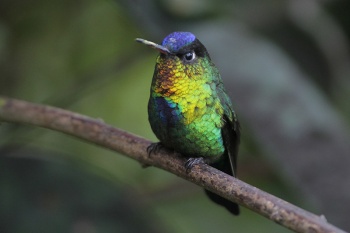(Flight picture. References updated) |
|||
| (11 intermediate revisions by 6 users not shown) | |||
| Line 1: | Line 1: | ||
| + | [[Image:Fiery-throated_Hummingbird.jpg|thumb|550px|right|Photo by {{user|gritstone|gritstone}}<br />La Georgina Restaurant (on Route 2, 3100 metres high), Cordillera de Talamanca, [[Costa Rica]], February 2007]] | ||
;[[: Category:Panterpe|Panterpe]] insignis | ;[[: Category:Panterpe|Panterpe]] insignis | ||
| − | [[Image:Fiery- | + | ==Identification== |
| + | 10 cm<br /> | ||
| + | Bill it thin, straight, of medium length. Mostly green with bluish rump and blue-black tail. Front blue, throat yellow-orange, breast blue-violet. Notice white postocular spot. | ||
| + | |||
| + | Sexes similar. | ||
| + | ====Similar species==== | ||
| + | [[Image:Fiery-throated_Hummingbird_Lavaty.jpg|thumb|350px|right|Photo by {{user|Peacefrog2|Greg Lavaty}} <br />Talamanca, [[Costa Rica]], December 2009]] | ||
| + | [[Talamanca Hummingbird]] is larger, relatively longer bill, and lack to blue tones on rump and tail. | ||
| − | |||
==Distribution== | ==Distribution== | ||
| − | [[Costa Rica]] and [[Panama]]. | + | [[Central America]]: found in [[Costa Rica]] and [[Panama]]. |
==Taxonomy== | ==Taxonomy== | ||
| − | Two subspecies are recognized | + | ====Subspecies==== |
| + | Two subspecies are recognized<sup>[[#References|[1]]]</sup>: | ||
| + | *'''P. i. eisenmanni'': | ||
| + | :*North-western [[Costa Rica]] (Cordillera de Guanacaste) | ||
| + | *'''P. i. insignis'': | ||
| + | :*North-central Costa Rica (Cordillera de Tilarán) to extreme western [[Panama]] | ||
==Habitat== | ==Habitat== | ||
| + | [[Image:11145.JPG|thumb|350px|right|Photo by {{user|nanus|nanus}} <br />Irazu Volcano National Park-Cartago, [[Costa Rica]], 2 March 2020]] | ||
| + | Inhabits the canopy of both wet and dry montane forests and shrubbery at forest edges (some sources states sometimes found below the canopy). Most of the year at heights above 2000 m (1500 m) [[Dictionary A-C#A|asl]], reported to go lower between March and July. | ||
==Behaviour== | ==Behaviour== | ||
| + | Readily uses feeders. Is often aggressive. | ||
| + | ==References== | ||
| + | #{{Ref-Clements6thAug19}}#BF Member observations | ||
| + | {{ref}} | ||
==External Links== | ==External Links== | ||
{{GSearch|Panterpe+insignis}} | {{GSearch|Panterpe+insignis}} | ||
| − | [[Category:Birds]][[Category:Panterpe | + | [[Category:Birds]][[Category:Panterpe]] |
Latest revision as of 22:33, 26 April 2020

La Georgina Restaurant (on Route 2, 3100 metres high), Cordillera de Talamanca, Costa Rica, February 2007
- Panterpe insignis
Identification
10 cm
Bill it thin, straight, of medium length. Mostly green with bluish rump and blue-black tail. Front blue, throat yellow-orange, breast blue-violet. Notice white postocular spot.
Sexes similar.
Similar species
Talamanca Hummingbird is larger, relatively longer bill, and lack to blue tones on rump and tail.
Distribution
Central America: found in Costa Rica and Panama.
Taxonomy
Subspecies
Two subspecies are recognized[1]:
- 'P. i. eisenmanni:
- North-western Costa Rica (Cordillera de Guanacaste)
- 'P. i. insignis:
- North-central Costa Rica (Cordillera de Tilarán) to extreme western Panama
Habitat
Inhabits the canopy of both wet and dry montane forests and shrubbery at forest edges (some sources states sometimes found below the canopy). Most of the year at heights above 2000 m (1500 m) asl, reported to go lower between March and July.
Behaviour
Readily uses feeders. Is often aggressive.
References
- Clements, J. F., T. S. Schulenberg, M. J. Iliff, S. M. Billerman, T. A. Fredericks, B. L. Sullivan, and C. L. Wood. 2019. The eBird/Clements Checklist of Birds of the World: v2019. Downloaded from http://www.birds.cornell.edu/clementschecklist/download/
- BF Member observations
Recommended Citation
- BirdForum Opus contributors. (2024) Fiery-throated Hummingbird. In: BirdForum, the forum for wild birds and birding. Retrieved 18 May 2024 from https://www.birdforum.net/opus/Fiery-throated_Hummingbird





